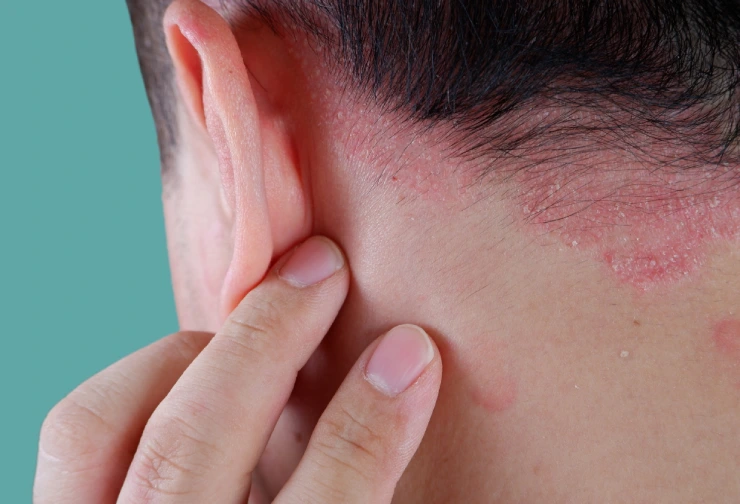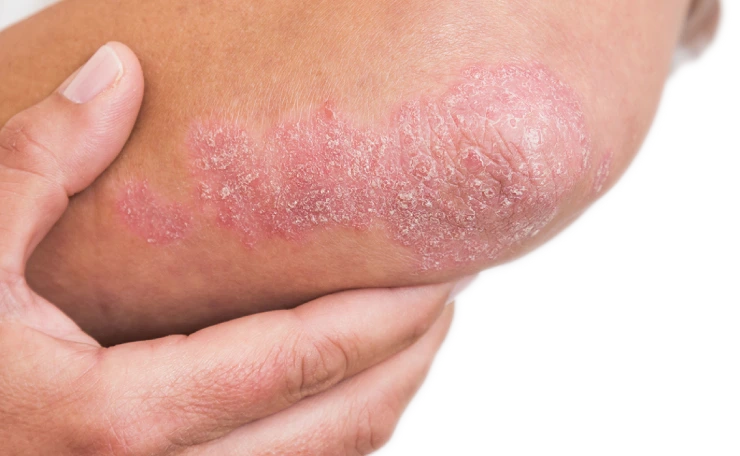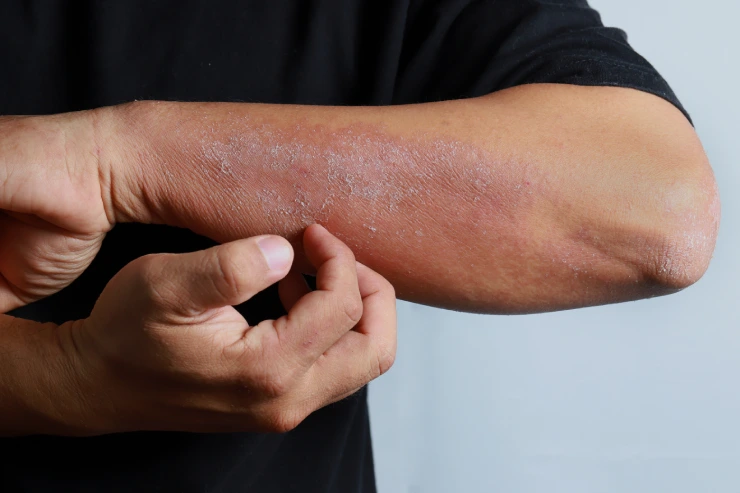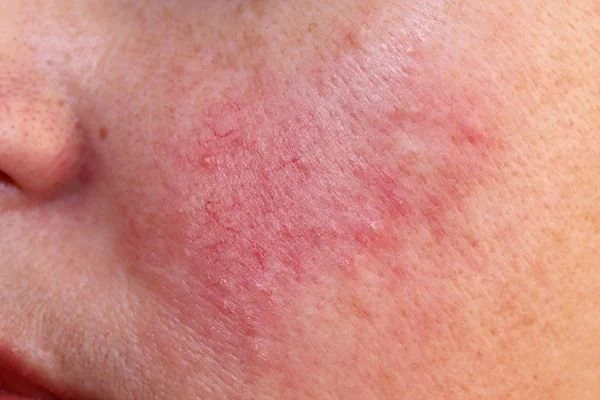Dear readers,
In this article we will look at the role of diet inpsoriasis. I look forward to sharing some useful tips for optimal nutrition in the hope that they can help you successfully manage your psoriasis. This compact nutritional guide is designed to support t, especially with regard to skin, nails and joints (psoriatic arthritis).

The relationship between psoriasis and your diet
Psoriasis is a chronic autoimmune skin disease in which the body mistakenly attacks its own tissue. This leads to an overproduction of skin cells that manifest as scaly, red patches on the skin. Although psoriasis is not directly caused by diet, there is an important link between diet and symptoms. Certain foods can trigger an inflammatory response in the body that can exacerbate symptoms.
How does food influence inflammation?
Studies suggest that certain foods, especially highly processed foods, can activate the body’s inflammatory mechanism. For example, high-fat foods can increase inflammation in adipose tissue, which increases the risk of psoriasis and other health problems.

Foods that should be avoided with psoriasis
1. alcohol: Excessive alcohol consumption puts a strain on the liver and can lead to long-term inflammation.
2. dairy products: Some dairy products are high in fat and can promote inflammation. Milk also contains casein, a protein that can cause digestive difficulties in some people.
3. refined carbohydrates: Highly processed carbohydrates such as white bread, white rice, pasta and sweets can increase blood sugar levels and lead to inflammation.
4. saturated and trans fats: These fats, which are found in red meat, cheese, fried foods and many processed snacks, can promote inflammation in the body.
5. sugar: Added sugar in soft drinks, fruit juices, sweets and baked goods can lead to inflammation and an increase in pro-inflammatory proteins.
6. gluten-containing foods: People with psoriasis may be more likely to have coeliac disease. Gluten, which is found in wheat and some cereals, can trigger an autoimmune reaction.
Measurement of inflammation in the body
Although not everyone reacts to certain foods in the same way, biomarkers in the blood can provide information about how the body reacts to fats or sugar. A simple test can detect elevated levels of C-reactive protein (CRP) in the blood, a sign of inflammation.
Recommended foods for psoriasis
To reduce inflammation, you should focus on a balanced diet. Recommended foods are:
- Fatty fish: Varieties such as salmon, mackerel or herring provide anti-inflammatory omega-3 fatty acids (EPA & DHA), which can help to soothe psoriasis-related skin inflammation and reduce the formation of scales.
- Vegetable oils: Oils from olives, linseed or hemp contain healthy unsaturated fatty acids and secondary plant substances that reduce oxidative stress and have a positive effect on inflammatory processes in the body.
- Whole grain products: Brown rice, spelt pasta and wholemeal bread provide the intestines with fibre, promote healthy intestinal flora and can therefore stabilize the immune system – an important factor in autoimmune diseases such as psoriasis.
- Fresh fruit and vegetables: Rich in beta-carotene, vitamin C and antioxidants, carrots, broccoli and berries, for example, support cell protection and can reduce inflammatory skin processes.
- Nuts and seeds: Walnuts, chia seeds and linseed provide valuable omega-3 fatty acids and fiber – they have an anti-inflammatory effect and strengthen the skin barrier.
- Pulses: Lentils, beans and chickpeas are rich in vegetable protein and filling fiber. They help to keep blood sugar levels stable and have a beneficial effect on inflammatory processes.
- Lean meat: Poultry or lean beef provide high-quality protein for cell building. Eaten in moderation, they can be part of a balanced diet – ideally replaced by fish.
- Alkalizing herbs: Herbs such as nettle, thyme or horsetail provide minerals and secondary plant substances that help to balance the acid-base balance and can regulate inflammatory processes.
- Drink enough: At least two liters of water or unsweetened herbal teas per day support skin hydration, help detoxify and promote a healthy metabolic state – important for psoriasis.
There is no clear evidence that vitamins or supplements relieve the symptoms of psoriasis. The best way to get all the nutrients you need is to eat a balanced diet. However, it is usually safe to take a daily multivitamin supplement. Discuss with your doctor or a nutritional expert which supplements are suitable for you.

How do I start a psoriasis diet?
If you want to adapt your diet to alleviate psoriasis symptoms, we recommend starting slowly. A radical change in diet is usually not sustainable and can lead to a lack of important nutrients. Instead, start by reducing highly processed foods.
Replace pastries and cookies with fresh fruit. Choose herbal tea or water with fresh fruit, mint or cucumber. If you think a particular food or ingredient triggers psoriasis flare-ups, talk to your doctor or a nutritionist.
Being overweight or obese can make psoriasis worse. Therefore, you may want to consider a weight loss plan that involves fewer calories and smaller portions. Any psoriasis treatment should be accompanied by healthy lifestyle choices. Make sure you get enough sleep and regular exercise and try to reduce stress. If you smoke, talk to your doctor about a plan to quit.
Our dedicated practice team is available to answer any questions or concerns you may have. We recommend discussing changes to your diet with your dermatologist to monitor symptoms and inflammation levels.
Psoriatic arthritis
Due to the fact that psoriasis is a systemic autoimmune disease and therefore affects the entire body, not only can the usual symptoms occur on the skin, but nails and joints can also be affected. Psoriatic arthritis that affects the musculoskeletal system can cause symptoms such as joint pain or back pain.
A balanced diet also plays an important role in psoriatic arthritis. However, it is important to emphasize that diet alone is not a cure for psoriatic arthritis. Holistic treatment, which also includes medical therapy and exercise, is crucial. Individual advice from specialists can help to develop a treatment strategy tailored to personal needs and integrate it into the overall treatment plan. It is advisable to discuss any changes to your diet with your doctor.
Please note that it is important to seek medical advice before making any major changes to your diet, especially if you have a chronic medical condition.
With the support of our practice team, you can take control of your psoriasis. Our experts are on hand to help you not only with skincare, but also with adjusting your diet to get the best results.
If you have any questions or would like personal medical advice regarding your psoriasis and specifically in relation to your diet, please do not hesitate to contact us. Our team is ready to offer you personalized advice and solutions tailored to your unique needs.
Keep up to date with the latest developments and advice on skin health by signing up to our newsletter below. Receive regular updates on relevant topics, research findings and tips to keep your skin in the best possible condition.
Your skin health is important to us. That’s why we accompany you on your way to healthier and radiant skin!
We look forward to supporting you on your journey.

Dr. med. Bijan Koushk Jalali
Specialist in skin and sexually transmitted diseases


